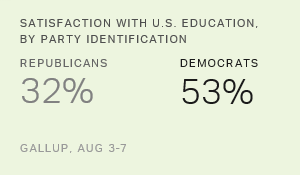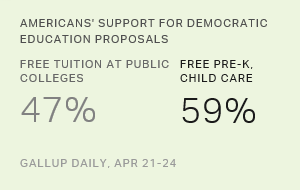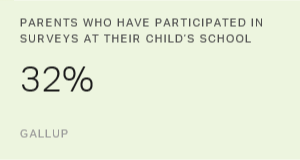Story Highlights
- 53% of Democrats, 32% of Republicans satisfied with U.S. education
- Majority of Americans dissatisfied with education U.S. children receive
- Most parents satisfied with own child's education
PRINCETON, N.J. -- Republicans' satisfaction with the education that U.S. students receive in grades K-12 has plummeted in the past two years to 32%, while Democrats' has edged a bit higher to 53%. The result is stark political polarization in Americans' views of U.S. education -- something that has been uncommon in Gallup's 18-year trend. Only two years ago, Republican and Democratic satisfaction were tied at 48%.
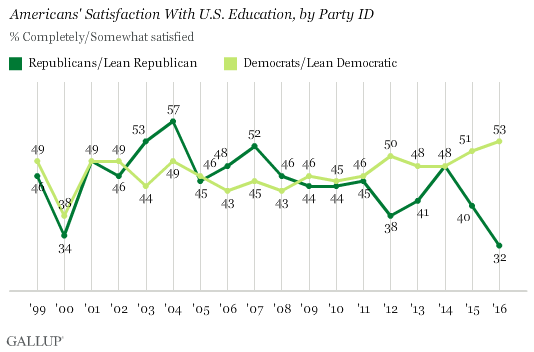
The reason for the increase in Republicans' satisfaction with students' education in 2014 is not clear. However, since then, criticism of the Common Core educational standards being implemented across the country -- standards most Republicans view negatively -- may help explain the decline in Republican satisfaction with education in 2015 and 2016. Various Republican leaders have taken issue with the Common Core for a number of years. However, strong opposition recently voiced by several Republican presidential contenders, including Donald Trump, may have heightened rank-and-file Republicans' concerns about the effect the standards are having on education.
Ratings of U.S. Education the Most Negative Since 2000
The recent decline in Republicans' satisfaction with education is partly neutralized by the rise in Democrats' satisfaction. Nevertheless, the 43% of all Americans now satisfied ties the lowest figure Gallup has recorded since dipping to 36% in 2000 -- that low point likely reflecting a strong focus on education reform in the 2000 presidential campaign.
The 55% now dissatisfied with U.S. education is, by one percentage point, the highest Gallup has recorded since 2000.
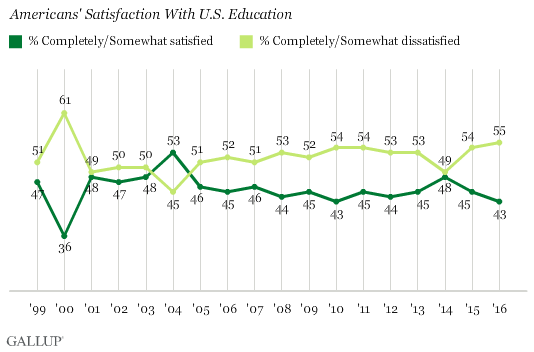
Parents' Experience With Education More Positive, Less Partisan
Although Americans overall hold a net-negative view of education, three-quarters of parents of K-12 students say they are satisfied with the education their oldest child receives, including 36% who say they are "completely satisfied" and another 40% who are "somewhat satisfied."
The combined 76% satisfied matches the trend average since 1999. Since then, only twice -- in 2002 and 2013 -- did parents' satisfaction drop much below the average.
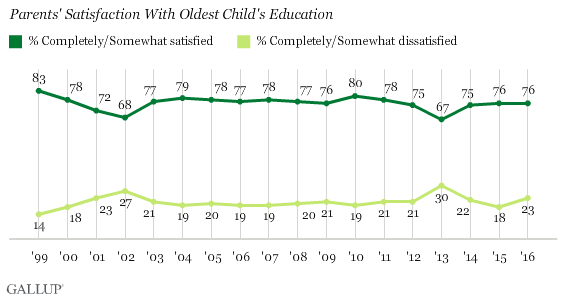
Parents' assessments of their own child's education have differed less by party over the years compared with attitudes about U.S. education in general. This year, identical percentages of Republican and Democratic parents (76%) report feeling satisfied.
Bottom Line
Almost nothing could be more important to the United States' future than providing its young people with a sound education. The significance of this goal may explain why the past two federal education laws -- No Child Left Behind (NCLB) and now the Every Student Succeeds Act (ESSA), which replaces NCLB -- both got through Congress with unusually broad bipartisan support.
One heartening finding is that those on the front lines of public education -- parents of children enrolled in kindergarten through grade 12 -- are largely satisfied with the education their oldest child receives. But only 36% are "completely satisfied," suggesting there is room for improvement.
Meanwhile, the partisanship that characterizes Americans' outlook on numerous U.S. policy issues -- from the Affordable Care Act to abortion to global warming -- now appears to be affecting the public's views of K-12 education. If this is merely the result of presidential campaign rhetoric about problems with the U.S. educational system, the gap is likely to close in the next year or two. Alternatively, if ESSA succeeds in returning more control of educational standards back to school districts and teachers, that may allay Republicans' concerns about the Common Core. Otherwise, if partisanship on education continues, congressional gridlock on education -- as seen with many other high-priority national issues -- may follow.
Historical data are available in Gallup Analytics.
Survey Methods
Results for this Gallup poll are based on telephone interviews conducted Aug. 3-7, 2016, with a random sample of 1,032 adults, aged 18 and older, living in all 50 U.S. states and the District of Columbia. For results based on the total sample of national adults, the margin of sampling error is ±4 percentage points at the 95% confidence level. For results based on the total sample of 254 parents of children in kindergarten through grade 12, the margin of sampling error is ±8 percentage points at the 95% confidence level. All reported margins of sampling error include computed design effects for weighting.
Each sample of national adults includes a minimum quota of 60% cellphone respondents and 40% landline respondents, with additional minimum quotas by time zone within region. Landline and cellular telephone numbers are selected using random-digit-dial methods.
View complete question responses and trends.
Learn more about how the Gallup Poll Social Series works.
